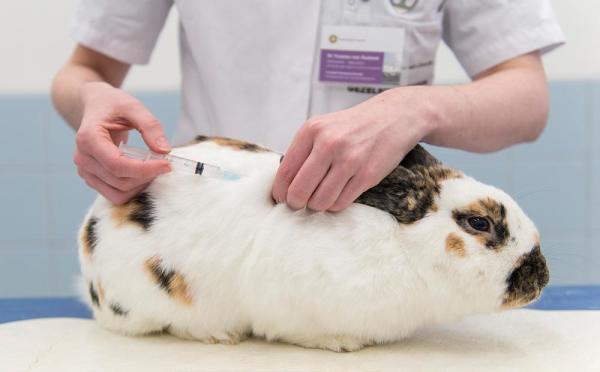Bunny
Do Bunnies/Rabbits Need Shots/Vaccines?#CareTips
The pet owner is always caring about his or her pets. That would perhaps explain why we pet owners enquire about the health precautions one needs to take with respect to the pets they own. Rabbits, just like other animals, need you to care for them. Being one of the most sensitive animals, they can be quite vulnerable to the diseases in which case bunnies would shake and thus would require a careful regime of health checkups.

But, do the bunnies need shots? Well, that would have a few legal implications as well. While most parts of the United States do not make it mandatory to opt for vaccination for the rabbits, Europe and Australia have strict regulations covering it.
Legal aspects apart, if you really care for your pet, it would be advisable to opt for vaccination for your pet rabbits. At least from the health perspective. Of course, there is nothing to lose, right?
Contents
Do Rabbits Need Vaccines?
Like we said before, that would be dependent on where exactly you live. Europe and Australia make it mandatory to opt for vaccinations, at least against two of the deadly diseases – myxomatosis and viral hemorrhagic disease.
These are contagious diseases observed in the wild rabbit and can easily pass to the domesticated pets as well. These two diseases are much common in the regions described above, and that is precisely why they mandate the pet owners to opt for the right vaccination.
Elsewhere in the world, it may be a little challenging to find a vaccination for the rabbits. If you are in the US or Canada, the answer to your question would be – NO!
What Vaccinations do Rabbits Need?
Yet again, that would be something dependent on the region you are from. The law and general perception can be quite confusing in areas such as the United States as to which vaccines would you need to opt for and which ones are illegal.
Having understood that, let us check out a few vaccines that a pet rabbit would need. Once again, the availability of these vaccines would primarily be dependent on the region you belong to.
Rabbit Myxomatosis Vaccine
The Myxomatosis can be transmitted to a rabbit from insects such as mosquitoes and fleas. The virus thus contracted spreads to the lymph nodes and from there to the entire body. The symptoms of the disease would manifest themselves as swelling of the eyelids, to lips followed by the genital region. It can ultimately cause blindness and cause death in around 8 to 15 days.
The virus has its origins, strangely enough, in the Americas, before spreading to the European and Australian region, but the rabbits in the US seem to have developed a resistance to the virus and are not affected by Myxomatosis.
Calicivirus
The disease is known by several names, most common of them being Rabbit Haemorrhagic Disease and Viral Haemorrhagic Disease. The disease affects the rabbits belonging to the Oryctolagus cuniculus species.
The diseases can spread by several means. It is primarily spread by insects, birds, and other animals – but can also be caused by clothing, shoes, and tires. While humans can spread the disease, they would not exhibit any signs of the sickness. The symptoms of the Calicivirus disease would include loss of appetite, spasms, and fever.
The disease is highly lethal and can cause death within 48 hours of being affected. That would explain why most of the rabbits die even before being diagnosed.
Filavac/RHD Rabbit Vaccine
This is the most commonly used vaccine to treat rabbits affected with RHDV2 or Rabbit (Viral) Haemorrhagic Disease 2. The disease is almost similar to Calicivirus we just covered above but comes with a few variations.
The significant difference between the Calicivirus and RHDV2 lies in the fact that the latter is less lethal and has a lower mortality rate in comparison. It was initially detected in France and was later found to be prevalent in Europe as well. The virus can spread through a rabbit to rabbit contact or through other household items such as bowls, glass, and cages.
The Filavac vaccination can be quite effective against both RHD and RHDV2. You can either opt for a single dose or multi dos options.
These are a few common vaccines for your pet bunny. Now, let us see do rabbits need vaccinations every year or what is the vaccination schedule.
Rabbit Vaccination Schedule – Chart to Help You Plan the Vaccines
It would be practical to have a schedule for vaccinating your bunnies. In fact, they can be vaccinated when they are five weeks old with a combined dose of the Myxomatosis-RHD1 vaccine. This will help develop immunity over the next three weeks’ time.
After that, it would be advisable to go with a vaccination plan on an annual basis.
The chart can somewhat be on the following lines:
First Vaccine | Combined Myxomatosis-RHD1 vaccine | When your bunny is five week’s old |
Subsequent Vaccines | Myxomatosis, RHD and Filavac | Every year |
Other Vaccines | RHVD2 | Every 6 to 12 months |
Do note that the RHVD2 vaccine should be administered at least apart from the annual Myxomatosis-RHD1 vaccine. It would be a good idea to talk with your vet to arrive at the best plans for your pets. The above chart is only for the general information, and you can work out a chart based on the individual needs that your pet may have.
Do they need vaccination every year? Well, that would be a great option to opt for an annual vaccination plan for your pet to ensure a healthy and longer life.
Rabbit Vaccinations’ Side Effects
Do the rabbit vaccinations have any sort of side effects? Well, as with every other vaccine – the ones given to humans included – the rabbit vaccines too have a few side effects. However, most of these signs should go away in a shorts span. However, knowing about them would be helpful for you better prepared than getting anxious.
The Side Effects the RHD vaccine would include:
- Loss of appetite
- Site reactions such as swelling, redness, and irritation
- Loss of hair
Of course, death may not be ruled out in some cases, but that would remain to be an extremely rare case. It can only happen in cases of a severe reaction, which is considerably rare.
The loss of appetite should vanish in a span of 24 hours. Other side effects would subside in a week’s time.
The side effects of Myxomatosis vaccine can include:
- Swelling at the vaccination site
- Fever
- Loss of appetite
It has been known to be a very safe vaccine for rabbits. The side effects, even in the case of an overdose, would be much minor.
Few Myths about Rabbit Vaccination
A bunny invariably needs vaccinations, but there are several myths surrounding the rabbit vaccinations. Understanding them and busting those myths can help you stay knowledgeable about your bunny’s health.
These myths really need to be taken care of. The rabbit or bunny is no less than a small baby in your house which needs vaccines for good health.
Concluding Thoughts on Do Bunnies Need Shots
Well, as you can see, the answer to the basic query we had in the beginning – Do Rabbits need vaccination – can have a variable answer. While we would assume it to be practical and a good idea to opt for vaccination for your bunnies, the availability will be restricted by your region.
In fact, your vet should be the right person to guide you on this aspect, and it would be dependent on the region where you belong to. Get in touch with your vet and discuss the vaccinations available in your area for the rabbits and how they can be administered. They would also be able to guide you on the legal aspects of the mandatory vaccines as well.

-

 Skunk4 years ago
Skunk4 years agoWhat Does Skunk Poop Look Like? Images & Identifications
-

 Bunny4 years ago
Bunny4 years agoPregnant Rabbit Labor Signs #Test#Symptoms#Age#Length
-

 Turtles4 years ago
Turtles4 years ago8 Basking Rocks/ Platforms for Turtles – A Perfect Guide
-

 Turtles5 years ago
Turtles5 years agoHow To Take Care of Turtle Egg At Home?
-

 Bunny5 years ago
Bunny5 years agoHow to Get Rid of Mites on Rabbits? #NaturalRemedies #Video
-

 Horse4 years ago
Horse4 years agoHow Much Weight Can a Horse Carry? #Clydesdale #Friesian #Mustang #Draft
-

 Turtles4 years ago
Turtles4 years agoHow to Take Care of Snapping Turtle Eggs? #Incubating #Hatching
-

 Bunny5 years ago
Bunny5 years agoHow to Potty Train a Rabbit in House? Tips on Litter Training


















